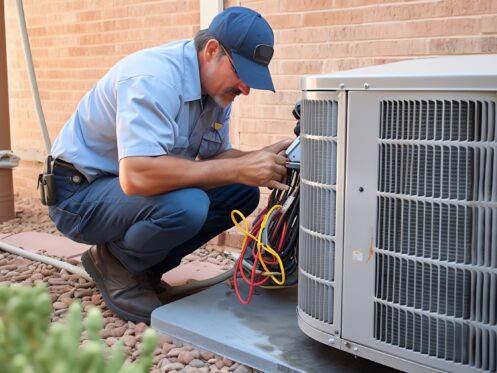Are you experiencing your air conditioner turning on and off frequently? This annoying and inefficient situation is known as short cycling. Short cycling is frustrating because it can interfere with your comfort, lead to increased energy bills, and potentially damage your AC unit. Understanding the root causes of short cycling can help you keep a comfortable home.
1. Dirty or Clogged Air Filters
Dirty or clogged air filters are among the most common causes of AC short cycling. When air filters are filled with dust, debris, and dirt, they restrict airflow and make it hard for the air conditioner to circulate air in your home correctly. This limitation forces your AC unit to work harder to achieve your desired temperature, which leads to overheating and short cycling. The system repeatedly turns on and off to prevent overheating, causing unnecessary wear and tear on internal components.
To fix this problem, an HVAC technician first inspects the air filters and replaces them if they are dirty or clogged. They may also clean the surrounding areas to make sure that no residual debris is left behind to clog the new filter. Additionally, the technician might check for any other underlying issues contributing to poor airflow, such as blocked ducts or dirty coils. Regular maintenance and air filter replacements are key to preventing short cycling.
2. Refrigerant Leaks and Low Levels
Refrigerant leaks and low levels are significant contributing factors for AC short cycling. The refrigerant is important for absorbing heat from your home and then releasing it outside. When refrigerant levels are low because of leaks, the AC unit will have a difficult time cooling your home, causing it to turn on and off frequently in an attempt to reach the set temperature.
This constant cycling not only fails to cool your home efficiently but also puts extra strain on the compressor, leading to potential damage and higher energy bills. An HVAC technician will diagnose this issue by checking the refrigerant levels and inspecting the system for leaks. If a leak is found, they will repair it, ensuring the system is sealed properly.
3. Oversized Air Conditioning Unit
An oversized air conditioning unit can cause short cycling. When an AC unit is too big for the home it’s supposed to cool off, then it can reach its set temperature too quickly, forcing the system to shut off. This constant starting and stopping prevent the unit from running long enough to properly dehumidify the air, which leaves your home feeling clammy even though it has technically reached its desired temperature.
To address this issue, an HVAC technician will perform a load calculation to figure out the best unit size for your home. If the current unit is oversized, the technician might recommend replacing it with one that matches your home’s cooling needs more accurately.
4. Electrical Problems and Faulty Wiring
Electrical problems and faulty wiring are common causes of AC short cycling. Issues such as damaged wires, malfunctioning components, or loose connections can all damage the electrical flow that is needed for the AC unit to operate properly. When the electrical supply is inconsistent, the AC system might turn on and off unpredictably, leading to short cycling. This not only reduces the efficiency of your cooling system but also poses potential safety hazards, including the risk of electrical fires.
5. Malfunctioning Thermostat
A malfunctioning thermostat can be a cause of AC short cycling because your thermostat is responsible for communicating the desired temperature to your AC system. If the thermostat is faulty and malfunctioning, it might incorrectly read the indoor temperature or fail to keep the set temperature, which would lead to short cycling. This can not only create an uncomfortable home environment but also increase wear and tear on the AC components, which can result in breakdowns and high energy bills. An HVAC technician will fix this issue by first testing the thermostat and then rewiring or replacing it.
6. Blocked or Restricted Airflow
Blocked or restricted airflow is a common cause of AC short cycling. When airflow is limited, the AC unit will struggle to move cooled air throughout your home. This can happen because of a number of reasons such as closed registers or blocked vents. As your AC works harder to try to compensate for the issue, the AC unit will overheat and short cycle. An HVAC technician will diagnose airflow issues by inspecting the vents, registers, and ductwork for any blockages or restrictions.
7. Improper Thermostat Placement
Improper thermostat placement is a lesser-known but significant problem that can contribute to AC short cycling. When a thermostat is installed in a location that doesn’t accurately represent the average temperature of your home, it can lead to incorrect temperature readings. For example, if your thermostat is located near a heat source, such as an appliance or sunny window, it might register a higher temperature than the actual average temperature in your living space. As a result, your AC unit might cycle on and off prematurely, failing to maintain a consistent temperature.
8. Frozen Evaporator Coils
Frozen evaporator coils are a common issue that can lead to AC short cycling. When your evaporator coils become frozen in your AC unit, you’ll typically experience limited airflow and potentially low refrigerant levels. This makes it impossible for your AC unit to absorb enough heat from your home, so the coils continue to accumulate ice and are unable to function correctly. Your AC unit will try to work overtime by cycling on and off as frequently as it can to maintain your desired temperature. An HVAC technician will diagnose frozen evaporator coils by inspecting the unit for ice buildup.
9. Shortage of Return Air Vents
Return air vents play a critical role in the cooling process by allowing warm air from your home to circulate back to the AC system for cooling. When there are insufficient return air vents or blocked or improperly sized vents, the AC unit needs help to draw in enough air to keep a proper airflow.
To address this issue, an HVAC technician will assess the number, size, and placement of return air vents in your home. They may need to add additional vents or adjust your existing ones to make sure that you have good airflow at home.
10. Faulty or Worn-out Compressor
A faulty or worn-out compressor is a problem that can lead to short cycling AC and also create a significant cooling problem for homeowners. The compressor is responsible for distributing refrigerant throughout the AC system and facilitating the heat exchange to create a cool environment. If the compressor is malfunctioning because of mechanical failures, an electrical problem, or wear and tear, then the compressor will be unable to maintain the pressure levels it needs to cool down your home. An HVAC technician will check electrical connections and run a pressure test to check your compressor.
Contact Us Today
Addressing AC short cycling is important for the longevity and efficiency of your cooling system. By understanding and tackling the top 10 causes — from dirty air filters to a faulty compressor — you can make sure that your home remains comfortable and energy-efficient. Regular maintenance can help you prevent short cycling. If you are unsure about diagnosing or fixing short cycling problems, don’t hesitate to consult a professional HVAC technician for AC repair.
At Sam's Air Control in Metuchen, NJ, we love helping our customers with their AC systems. From diagnosing AC short cycling to other issues, we repair and replace AC systems so that our customers can feel relaxed and comfortable year-round. We also provide commercial HVAC, ductless HVAC, boilers, geothermal, and indoor air quality services. Contact Sam's Air Control today!


